Best Crypto Wallets Of 2025
Discover our list of the top-rated crypto wallets, chosen after thorough individual testing. Learn more with the comprehensive reviews of the finest hardware wallets, helping you to make an informed decision. Use the exclusive coupons to save when purchasing your preferred wallet (where applicable).
After testing and reviewing, one by one, the best crypto wallets, it's now time to assess and rank them using our proprietary measure, the blockdyor Score. This unique metric provides a comprehensive evaluation of each wallet's security features and functionalities.
In this evaluation, our focus will be just on hardware wallets (also called: signing devices). These physical devices safeguard the private keys of your cryptocurrencies, such as Bitcoin, ensuring their security by storing the private keys in "cold storage", which means basically offline. This is crucial because possession of the private key grants control over the associated funds, making it imperative for a hardware wallet to be impregnable to anyone other than its owner, even in the event of theft.
While individual preferences vary, whether prioritizing affordability, user-friendliness, or opting for an air-gapped solution, our rankings will prioritize security aspects. This is particularly vital considering that users may store anything from a few thousand dollars to millions or even billions in cryptocurrency value. As such, we will prioritize key security features such as open-source transparency, firmware reproducibility, secure elements, among others outlined in the blockdyor Score.
The Best Cryptocurrency Wallets For 2025
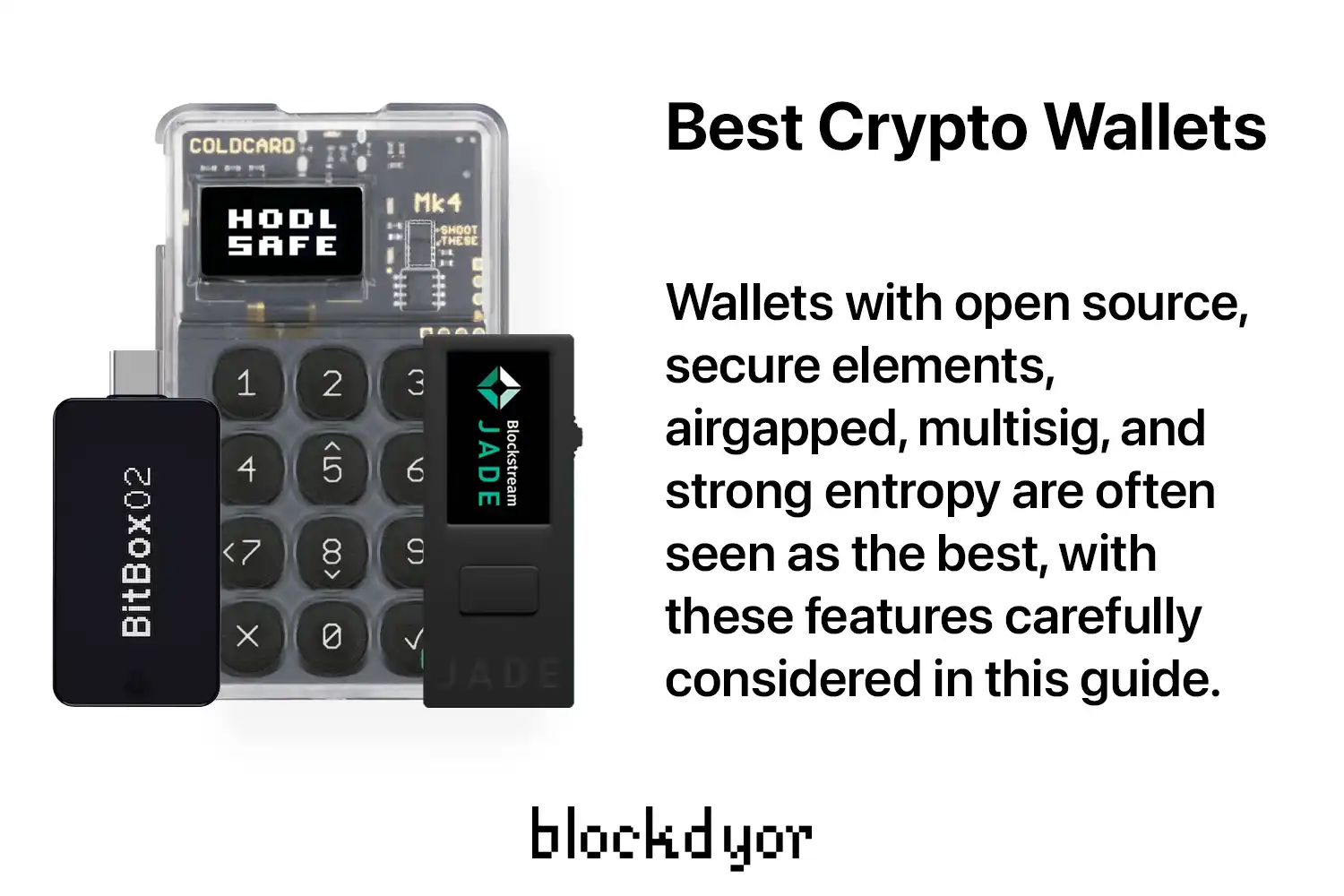
The list below comprises all hardware wallets that we've rigorously tested firsthand, meticulously evaluating each aspect to provide ratings based on our proprietary blockdyor Score. The list it's arranged from best to worst, with higher ratings indicating superior performance.
- 🥇 Foundation Passport
- 🥈 BitBox02
- 🥉 Keystone 3 Pro
- 🎖️ Blockstream Jade
- 🎖️ Coldcard MK4
- 🎖️ Trezor Safe 3
- 🎖️ Satodime
- 🎖️ Trezor Model T
- 🎖️ Cypherock X1
- 🎖️ Trezor One
- 🎖️ OneKey Classic
- 🎖️ Satscard
- 🎖️ Tapsigner
- 🎖️ Ledger Nano S
Let's take a closer look at each of these crypto wallets. Learn more by reading the full review at the end of each section or click the secure link to secure the device you're interested in. Keep an eye out for any discount codes available.
Foundation Passport

Key Specs
| Wallet | Price | Open Source | blockdyor Score |
|---|---|---|---|
| Foundation Passport | €199.00 ($199.00) | Yes | ⭐⭐⭐⭐⭐ 99/100 |
Why We Chose It
With an impressive Blockdyor score of 97/100, the Foundation Passport stands as our top-rated and undefeated crypto wallet. This bitcoin-only wallet, engineered in the USA, excels in every aspect, from its meticulous design to its extensive range of functions. It is truly air-gapped, allowing for transaction creation via SD card and PSBT technology, as well as using the integrated camera for signing transactions. While not mandatory, the companion app Envoy offers a more straightforward user experience for those who prefer it.
The Foundation Passport's commitment to open-source software (FOSS), high-quality construction, and exceptional security features earn it the highest spot in our rankings. This premium quality does come at a higher price than average, but it is well worth the investment.
Pros & Cons
| Pros | Cons |
|---|---|
| ✅ Premium feeling | ❌ Keypad buttons lack substantial travel |
| ✅ Easy to use User Interface | ❌ Price is high |
| ✅ IPS Display | |
| ✅ Fully Airgapped | |
| ✅ FOSS |
Overview
Foundation is a pioneering company specializing in the creation of the Passport, a hardware wallet exclusively designed for Bitcoin. The Passport, which emerged in 2022 as Foundation Devices' second-generation Bitcoin hardware wallet, follows the 2020 "Passport Founders Edition". Assembled in the USA, it emphasizes air-gapped security, ensuring true cold storage without any direct connection to the external world.
The Passport's upgrades from the Founders Edition include a slightly increased size with a reduced thickness, a USB-C charging port, a color IPS display, rectangular keypad keys, and an enhanced lithium-ion battery. It is built with privacy-conscious Bitcoin users in mind, featuring air-gapped communication through a camera and QR codes, triple sources of entropy for secure seed phrase generation, and a user-removable battery.
The Passport's software is open-source (FOSS), released under the GNU General Public License version 3 (GPLv3), ensuring user freedoms to run, study, share, and modify the software. The hardware design files are also open-source under the CERN-OHL-S v2 license.
Full Review

BitBox02
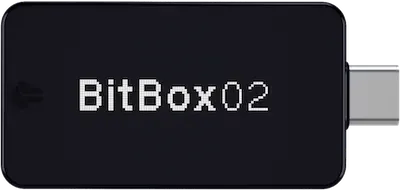
Key Specs
| Wallet | Price | Open Source | blockdyor Score |
|---|---|---|---|
| BitBox02 | €149.00 ($150.00) | Yes | ⭐⭐⭐⭐⭐ 93/100 |
👉 Click here to get the BitBox02. Use code BLOCKDYOR to get 5% off at checkout.
Why We Chose It
The BitBox02, made in Switzerland, offers two variants: a Bitcoin-exclusive option and an altcoin version (Litecoin, Cardano, Ethereum, Chainlink, BAT and 1500+ ERC20 tokens). Renowned for its extensive open-source nature, both in hardware and software, it features a firmware that is entirely reproducible. While its vendor wallet (the BitBoxApp) provides straightforward usability, so it's great for beginners, it's also suitable for more experienced users with support for advanced configurations.
While priced at a medium to high range, its sturdy build quality is commendable. Additionally, it comes bundled with high-quality microSD and other essential accessories, making it a comprehensive solution for cold storage of Bitcoin or Altcoins without the need for additional purchases.
Pros & Cons
| Pros | Cons |
|---|---|
| ✅ 100% Open Source | ❌ No Airgapped mode |
| ✅ 100% Firmware Reproducible | ❌ No iOS App |
| ✅ Entropy is generated from 5 different sources | ❌ No connectivity other than USB |
Overview
The BitBox02, a hardware wallet renowned for its commitment to uncompromising principles, epitomizes integrity in cryptocurrency storage. This Swiss-made device, excels with its complete open-source nature, supporting both vendor and third-party wallets like Sparrow Wallet and Electrum.
Available in Bitcoin-only and universal versions, BitBox02 offers tailored solutions to cryptocurrency enthusiasts. The Bitcoin-exclusive variant reduces code complexity, ensuring heightened security for BTC storage. Despite its medium/high price point, BitBox02 delivers premium quality, complemented by accessories like a high-quality microSD card. Its intuitive interface caters to novice and experienced users alike, with advanced features like custom entropy addition for private key generation.
With a dual-chip secure element architecture and adherence to open-source principles, BitBox02 ensures robust protection for cryptocurrency assets. Its compact and discreet design (it looks like an USB pen) makes it an ideal choice for secure storage and transactions, reflecting a fusion of Swiss craftsmanship and cutting-edge technology.
Full Review
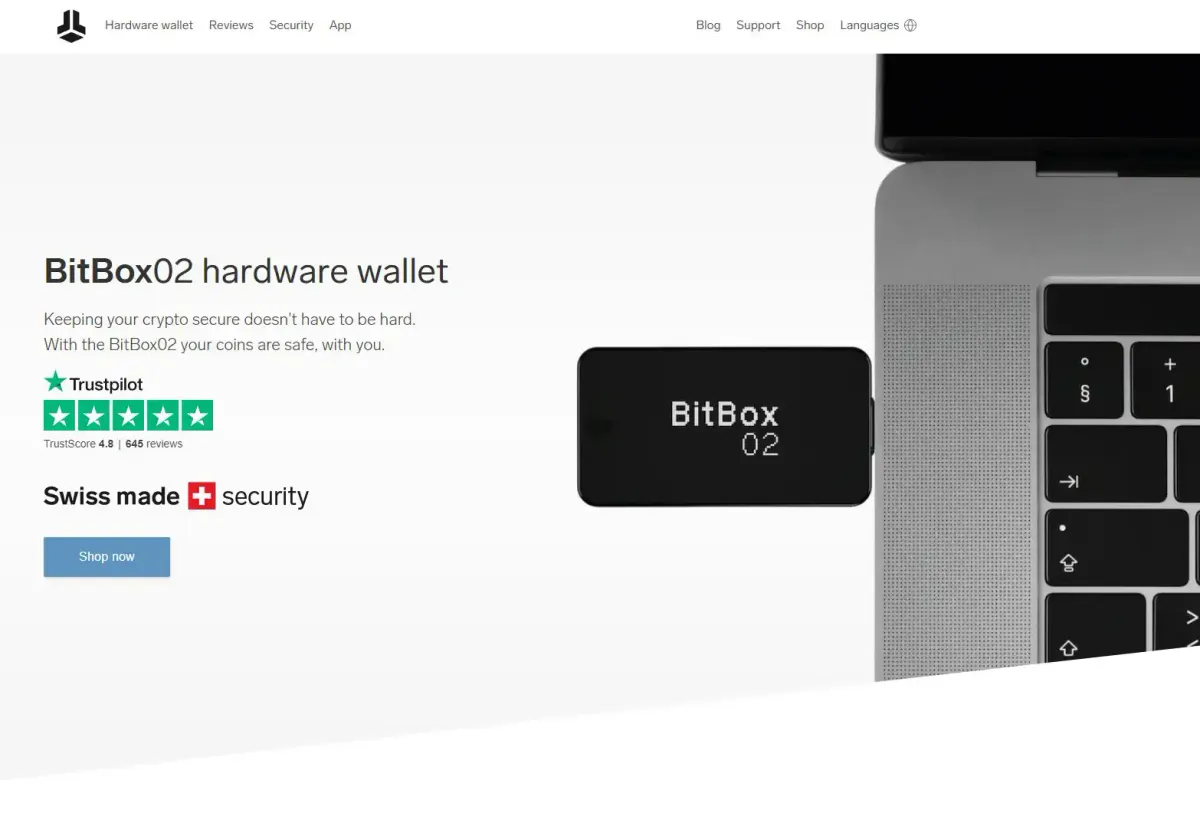
Keystone 3 Pro
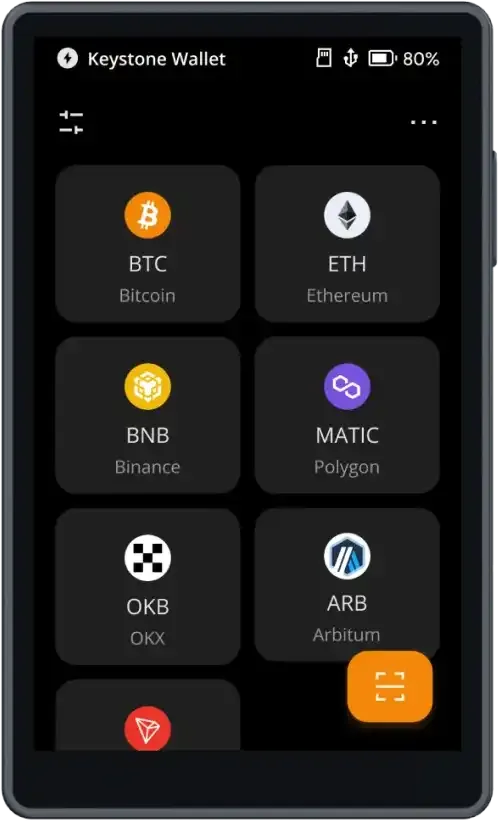
Key Specs
| Wallet | Price | Open Source | blockdyor Score |
|---|---|---|---|
| Keystone 3 Pro | €142.84 ($149) | Yes | ⭐⭐⭐⭐⭐ 93/100 |
👉 Click here to get the Keystone 3 Pro. Use code BLOCKDYOR at checkout for an exclusive 10% discount.
Why We Chose It
The Keystone 3 Pro is an outstanding open-source hardware wallet, designed to be airgapped by default. It offers the flexibility of a multi-coin firmware or a Bitcoin-only firmware, catering to diverse user needs. Its robust build quality, combined with the convenience of a built-in battery, makes it both durable and user-friendly.
The inclusion of a camera allows for seamless airgapped transaction signing, enhancing security and ease of use. One of its standout features is the large touchscreen display, which significantly improves usability. With its high level of security, bolstered by a dual secure element, the Keystone 3 Pro consistently ranks among the top choices in our list of favorite crypto wallets.
Pros & Cons
| Pros | Cons |
|---|---|
| ✅ 100% foss and reproducible | ❌ Non-removable battery |
| ✅ The secret is stored in the secure element | ❌ MicroSD must be purchased separately |
| ✅ Big and color capacitive touch screen | ❌ No MicroSD Backup |
Overview
The Keystone 3 Pro is a cutting-edge hardware wallet designed for secure cryptocurrency storage and management. Released in 2023, it has quickly gained popularity for its robust security features, user-friendly design, and versatility. Priced at $149, it supports over 5,000 cryptocurrencies, including Bitcoin and numerous altcoins, making it a top choice for both Bitcoin enthusiasts and multi-coin users.
The device boasts a 4-inch full-color touchscreen, offering a smartphone-like experience for managing transactions. Its air-gapped operation ensures maximum security by eliminating connectivity risks, relying on QR codes and MicroSD cards for offline data transfer. The Keystone 3 Pro is equipped with three Secure Element chips, fingerprint authentication, and PCI-level anti-tamper mechanisms, making it one of the most secure wallets on the market.
Additional features include Shamir Backup, multi-seed phrase management, and a Bitcoin-only firmware option, catering to diverse user needs. Its open-source design under the MIT License ensures transparency and trust. With compatibility for third-party apps like BlueWallet and MetaMask, the Keystone 3 Pro combines advanced security with flexibility, making it a standout choice for crypto enthusiasts.
Full Review
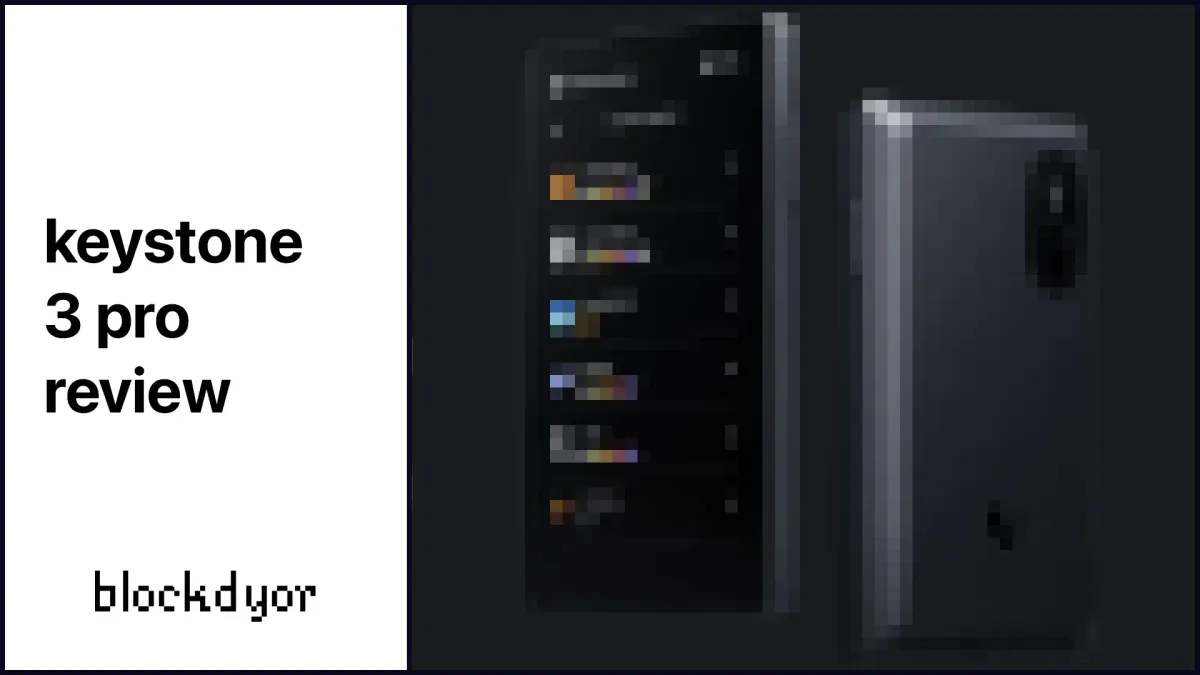
Blockstream Jade
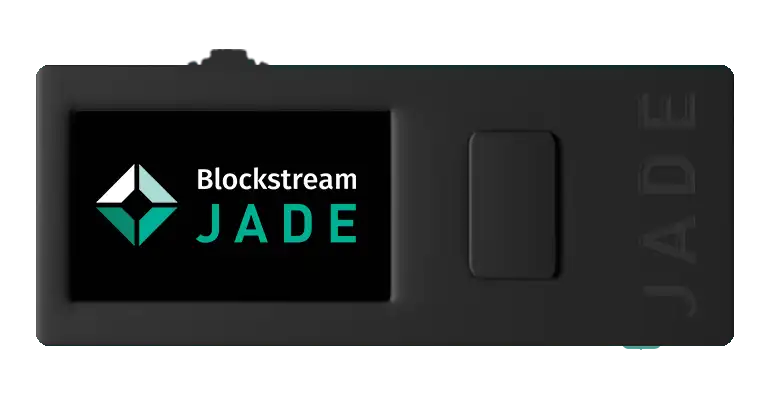
Key Specs
| Wallet | Price | Open Source | blockdyor Score |
|---|---|---|---|
| Blockstream Jade | €60.95 ($64.99) | Yes | ⭐⭐⭐⭐⭐ 92/100 |
👉 Click here to get the Blockstream Jade. Use code BLOCKDYOR at checkout for an exclusive 10% discount.
Why We Chose It
The Jade, made by the Canadian brand Blockstream, undoubtedly offers the highest value for money among hardware wallets. Despite its fraction of the price compared to others, it surpasses expectations while maintaining open-source integrity and air-gapped capabilities.
It's crucial to emphasize that Jade is exclusively designed for Bitcoin, foregoing support for altcoins. However, it compensates by accommodating Liquid Assets like Liquid Bitcoin (L-BTC), Liquid USDt, and numerous others. This specialization in Bitcoin and it's most used sidechain (the Liquid Network) ensures focused functionality and optimized performance for Bitcoin enthusiasts. With its affordability and robust features, the Jade stands as a compelling choice for those seeking efficient and cost-effective Bitcoin storage solutions.
Pros & Cons
| Pros | Cons |
|---|---|
| ✅ Very good price point | ❌ Missing Micro-SD slot for backup/alternative airgap |
| ✅ 100% Open source software and hardware | |
| ✅ Great design |
Overview
The Blockstream Jade, is a remarkable Bitcoin-only hardware wallet. This Canadian-made device, a testament to Blockstream's commitment to excellence, incorporates cutting-edge technology at an unbeatable price.
While exclusively focused on Bitcoin, the Jade supports also Liquid Assets like Liquid Bitcoin and Tether Dollar, ensuring versatility in managing cryptocurrency portfolios. Notably, Blockstream Green, the companion app, extends functionality to Lightning Network transactions, further enhancing the user experience.
With robust security features including a virtual secure element, BIP39 Passphrase, SeedQR airgapped operation, and tamper-evident packaging, the Jade prioritizes asset protection. Its sleek design, compact dimensions, and user-friendly interface make it an ideal choice for Bitcoin enthusiasts seeking reliable storage solutions.
Full Review
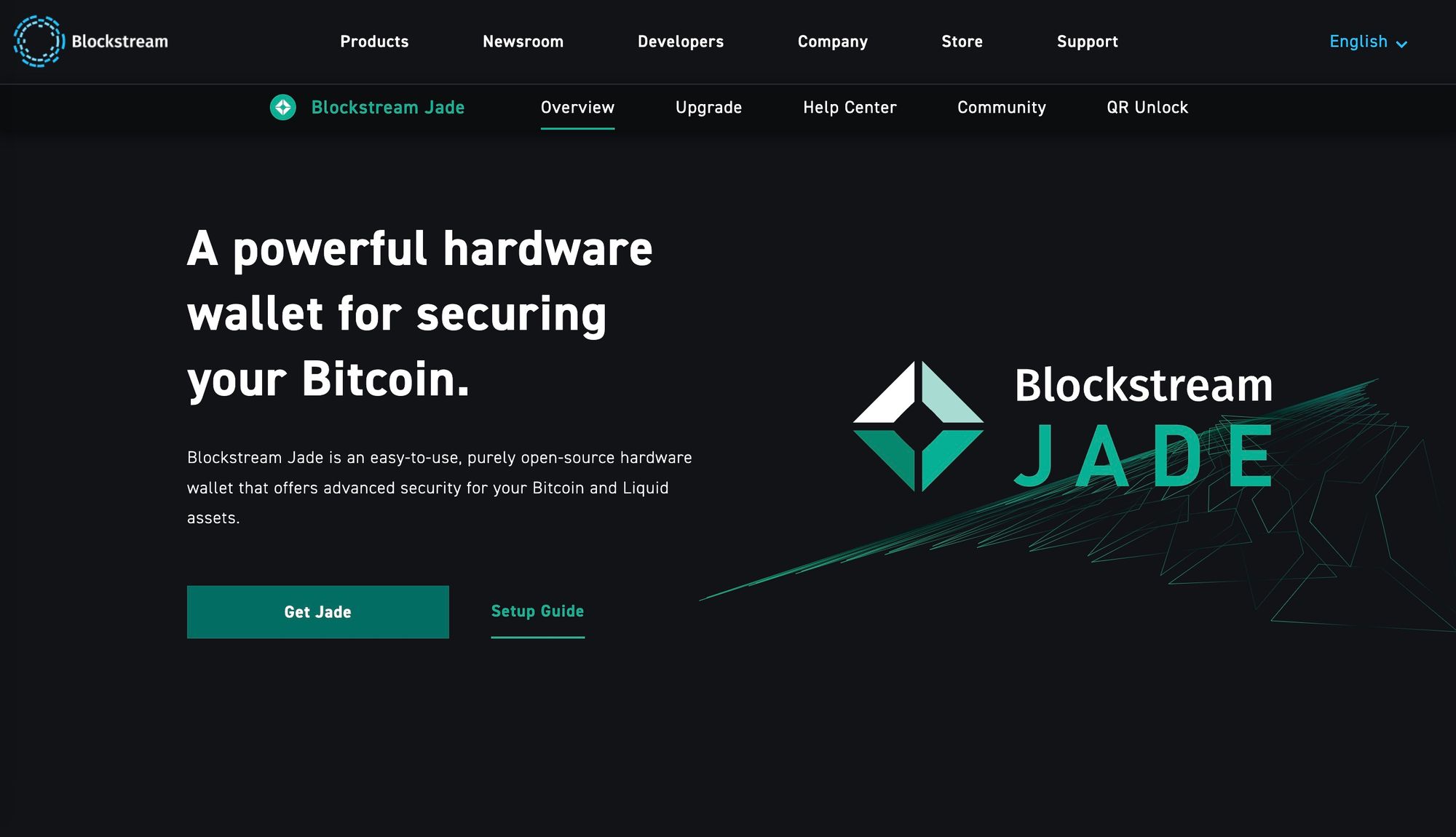
Coldcard MK4
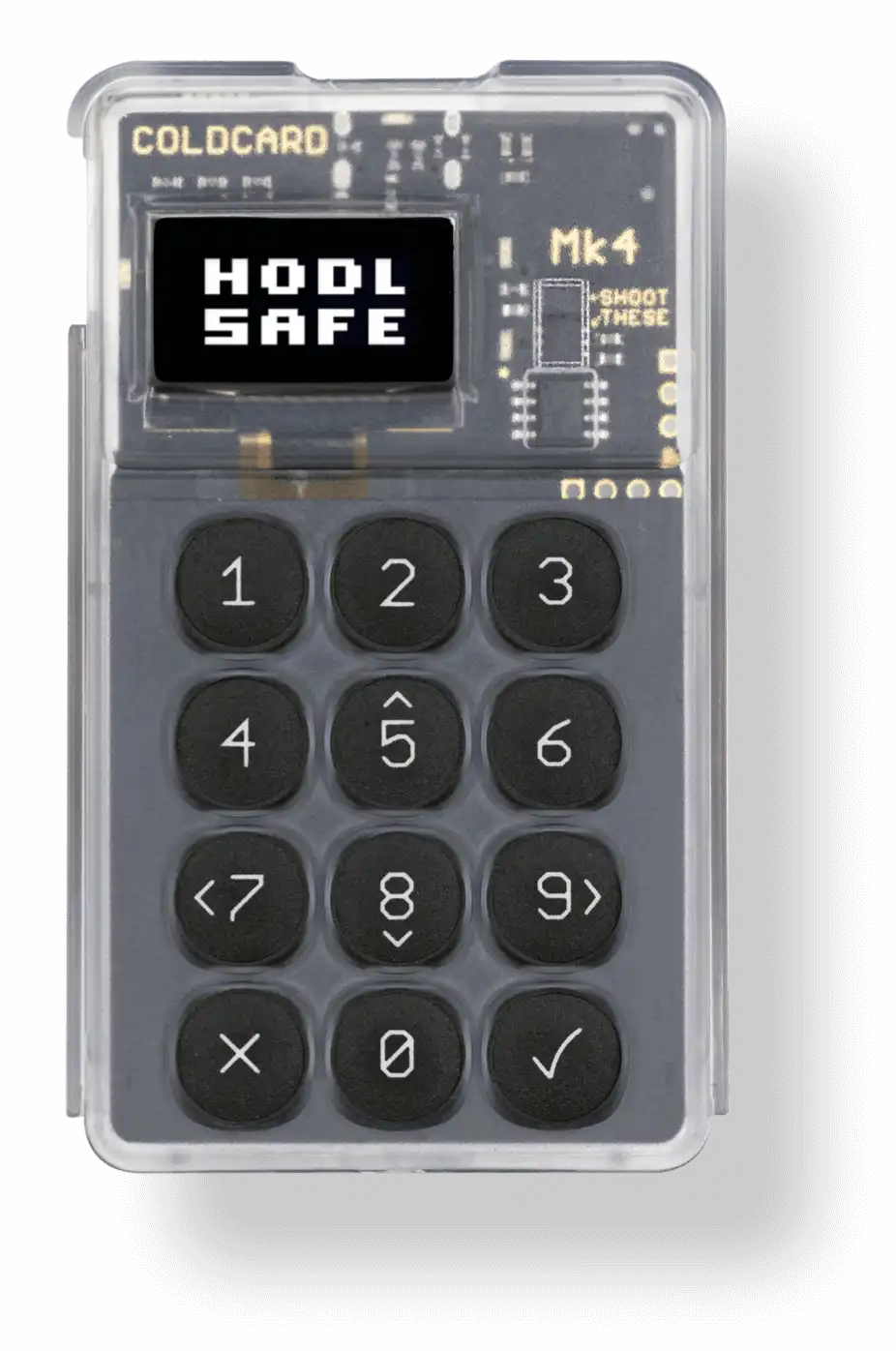
Key Specs
| Wallet | Price | Open Source | blockdyor Score |
|---|---|---|---|
| Coldcard Mk4 | €134.31 ($147.94) | Yes (Source Available) | ⭐⭐⭐⭐⭐ 90/100 |
👉 To get the COLDCARD Mk4 for a special price on the Coinkite's official website, click here.
Why We Chose It
Coinkite, a Canadian company renowned for its Bitcoin-exclusive hardware wallets, is the manufacturer of the Coldcard Mk4, now in its fourth iteration, revered as the go-to choice for cold storage by many seasoned Bitcoin enthusiasts.
The Coldcard distinguishes itself with advanced features like the integrated dice roll interface, air-gapped functionality, and its insistence on third-party vendor usage, a strategic move aimed at minimizing potential attack vectors. While the Coldcard may appear daunting to newcomers initially, Coinkite's comprehensive documentation available on their website ensures a smooth learning curve from scratch without any hindrance.
Pro & Cons
| Pros | Cons |
|---|---|
| ✅ Dual Secure Element for safe seedphrase storage | ❌ May not be as user-friendly or intuitive as other hardware wallets for those new to the space |
| ✅ True air-gap for added security | ❌ No touchscreen |
| ✅ Verifiable source code | ❌ Doesn't support altcoins |
Overview
The Coldcard Mk4, developed by Canadian company Coinkite, is a hardware wallet designed exclusively for Bitcoin. Despite its minimalist design and compact size, the Coldcard packs exceptional functionality and security features. With a focus solely on Bitcoin, it ensures streamlined performance and robust protection for users' cryptocurrency holdings.
Notable features include Double Secure Element chips, BIP39 Passphrase support, and fully air-gapped operation, enhancing security for users. Coinkite's commitment to transparency is evident through its verifiable source code, integrated firmware signatures check, and detailed documentation, becoming an interesting choice to both seasoned Bitcoin enthusiasts and newcomers alike.
The Coinkite's dedication to Bitcoin and emphasis on security make it a compelling choice for those prioritizing the protection of their digital assets.
Full Review
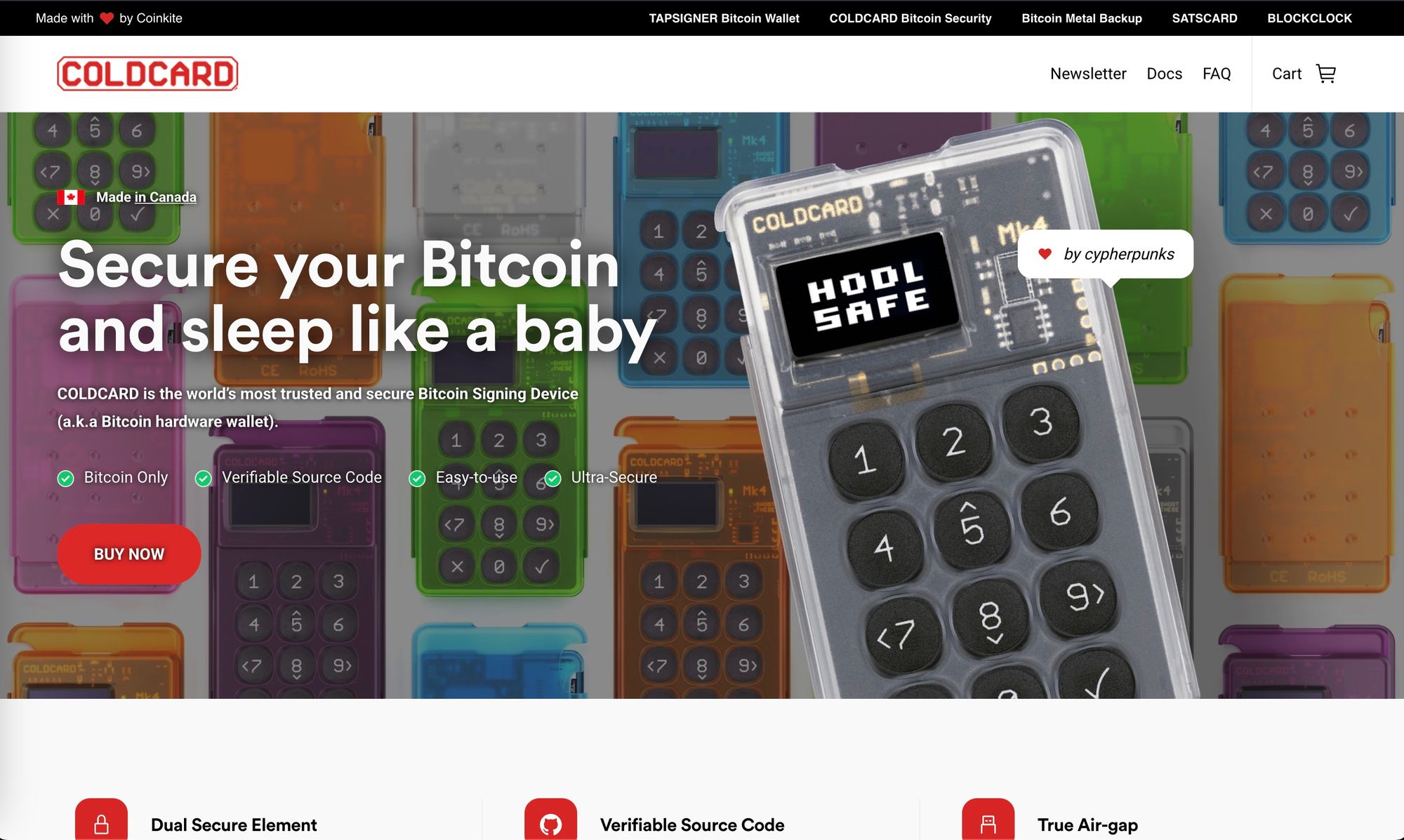
Trezor Safe 3
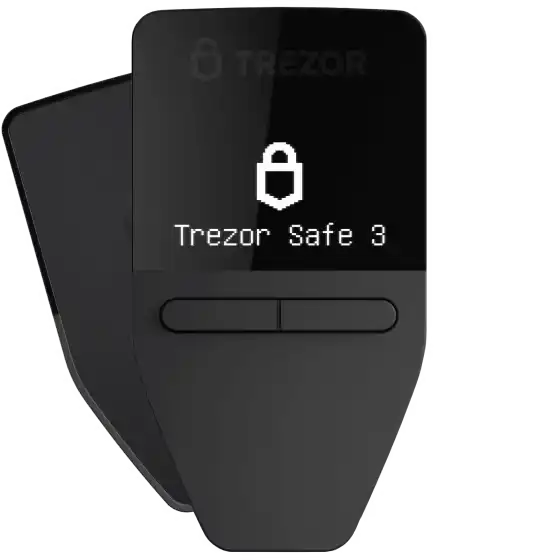
Key Specs
| Wallet | Price | Open Source | blockdyor Score |
|---|---|---|---|
| Trezor Safe 3 | €79.00 ($86.05) | Yes | ⭐⭐⭐⭐⭐ 83/100 |
👉 Get the Trezor Safe 3 from the official website. Use code BLOCKDYOR at checkout for a 10% discount..
Why We Chose It
The Safe 3, Trezor's latest iteration, represents an evolution from their original hardware wallet, the Trezor One. Renowned for its user-friendly interface, it seamlessly integrates with the Trezor Suite, enabling effortless management of various cryptocurrencies beyond Bitcoin.
Offering affordability and versatility, the Safe 3 is suitable to both novice and advanced users. It supports single-signature backup as well as advanced solutions like Shamir Secret Sharing, enhancing security for those seeking more robust protection for their assets. With its wide range of features and accessible interface, the Safe 3 stands as a good choice for users looking for a reliable and versatile hardware wallet solution.
Pros & Cons
| Pros | Cons |
|---|---|
| ✅ Secure Element | ❌ No Airgapped mode |
| ✅ Great materials | ❌ No dice rolls as entropy source for seed generation |
| ✅ Lightweight |
Overview
The Trezor Safe 3 is the latest addition to the Trezor's famous line of hardware wallets. Departing from its predecessors, the Trezor One and Trezor Model T, the Safe 3 prioritizes security, boasting for the first time on this brand a Secure Element chip to fend off physical attacks. Unlike the Bitcoin-only edition released during Bitcoin Amsterdam 2023, the Safe 3 offers versatility, supporting also multiple cryptocurrencies.
Key features include compatibility with Shamir Secret Sharing for enhanced security, Coinjoin (powered by Wasabi) readiness for improved Bitcoin transaction privacy, and an optional passphrase feature for an added layer of protection. The inclusion of an EAL6+ certified Secure Element chip from Infineon Technologies AG further bolsters security against physical threats.
With a bright OLED display and the option for a Bitcoin-only firmware, the Trezor Safe 3 stands as a top contender in the hardware wallet arena, offering comprehensive security features and ease of use.
Full Review
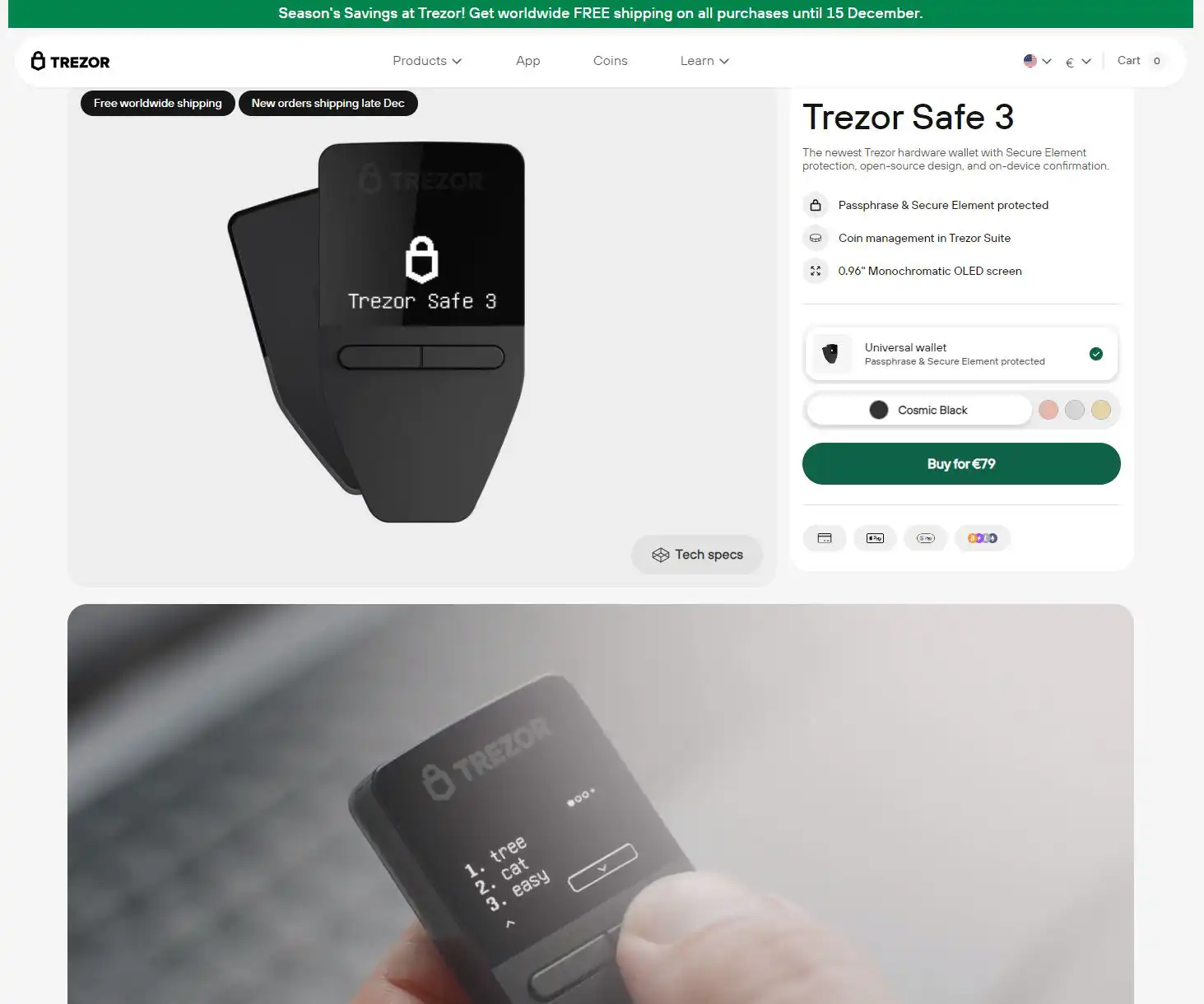
Satodime
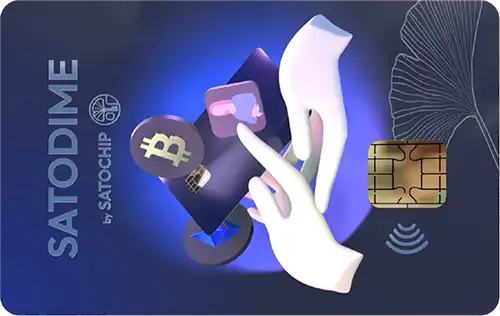
Key Specs
| Wallet | Price | Open Source | blockdyor Score |
|---|---|---|---|
| Satodime | €25.00 ($25.00) | Yes | ⭐⭐⭐⭐⭐ 83/100 |
Why We Chose It
Satodime by Satochip offers a unique solution for self-custody or even gifting Bitcoin and other cryptocurrencies, bridging the physical and digital worlds seamlessly. With its bearer token concept, it simplifies peer-to-peer trades and eliminates the need for KYC, ensuring user privacy.
The card's NFC technology allows for easy balance checks and secure transactions, making it an ideal choice for both beginners and experienced users alike. Additionally, its commitment to free software and robust security features, including a secure element chip, instills confidence in its reliability and safety.
Pros & Cons
| Pros | Cons |
|---|---|
| ✅ Free software | ❌ Need third party wallet to sweep the funds |
| ✅ Economical | ❌ No PIN |
| ✅ Reusable |
Overview
Satodime, created by the Belgian startup Satochip, redefines the concept of cryptocurrency storage with its innovative bearer token design. Unlike traditional hardware wallets, Satodime functions as a physical means of transferring Bitcoin, cryptocurrencies, and even NFTs between users, akin to cash or a banking check.
This credit card-sized smart card offers simplicity and convenience, allowing users to securely hold and gift crypto without the hassle of KYC. With features like NFC connectivity, customizable designs, and a commitment to free software, Satodime stands out as a versatile and user-friendly solution for secure cryptocurrency transactions.
Trezor Model T
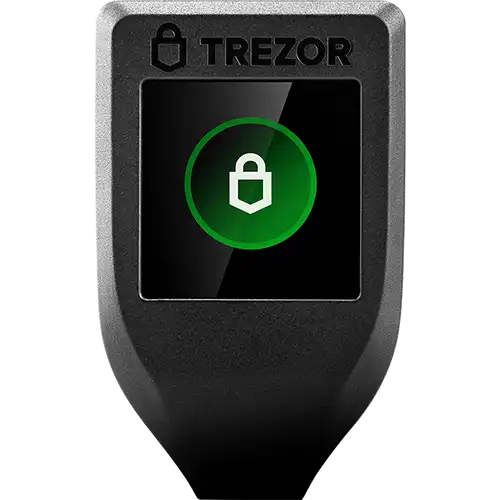
Key Specs
| Wallet | Price | Open Source | blockdyor Score |
|---|---|---|---|
| Trezor Model T | €179.00 ($179.00) | Yes | ⭐⭐⭐⭐⭐ 83/100 |
Why We Chose It
The premier offering from Czech-based Trezor, this hardware wallet boasts a vibrant color display and intuitive touchscreen functionality. Positioned at the pinnacle of the company's product lineup, it's an ideal choice for enthusiasts who prefer touchscreens and prioritize reliability.
Engineered to safeguard Bitcoin and a vast array of altcoins (over 8500), the Model T excels with its user-friendly interface and comprehensive privacy features. Whether you're drawn to its seamless coinjoin and shamir capabilities or simply seek a dependable hardware wallet, the Model T delivers a compelling solution for secure cryptocurrency storage.
Pros & Cons
| Pros | Cons |
|---|---|
| ✅ Evolution of the first-ever hardware wallet | ❌ Some tokens are not supported, others need 3rd party wallets |
| ✅ Open Source | ❌ Doesn't have a Secure Element chip |
| ✅ Great design, touchscreen | ❌ No battery nor wireless connectivity, only tethering |
Overview
The Trezor Model T, SatoshiLabs' flagship hardware wallet, represents a substantial upgrade over its predecessor. Engineered for the secure storage of Bitcoin and over 8500 altcoins, it offers an intuitive interface and an array of features.
This comprehensive guide scrutinizes every aspect of the Model T, evaluating whether the added cost justifies the upgrade. With a vibrant color touchscreen display and user-friendly functionality, the Model T ensures ease of use. Its offline storage mechanism maintains the safety of private keys, while open-source software gives transparency and community verification. Enhanced security features include Shamir Backup and passphrase-protected hidden wallets.
Despite the absence of a secure element, the Model T offers robust protection against online threats. SatoshiLabs' commitment to innovation and security shines through, making the Trezor Model T a compelling choice for safeguarding cryptocurrency assets.
Full Review

Cypherock X1
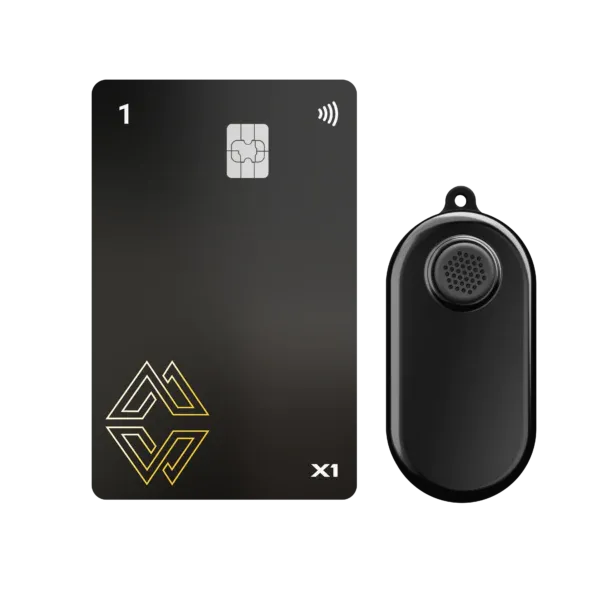
Key Specs
| Wallet | Price | Open Source | blockdyor Score |
|---|---|---|---|
| Cypherock X1 | €179.00 ($189.02) | Yes | ⭐⭐⭐⭐⭐ 81/100 |
Why We Chose It
The Cypherock X1 stands out from other hardware wallets by implementing solely the Shamir Secret Sharing. This crypto hardware wallet is designed to securely store not only Bitcoin but also over 1000 other types of alternative cryptocurrencies. Instead of storing private keys in a single location, the Cypherock X1 distributes them across multiple NFC cards, enhancing security.
This approach minimizes the risk of loss or theft, as even if a user loses access to one card, their cryptocurrency remains protected on the others (the threshold for retrieving the funds requires 2 out of 5 shares). Unlike conventional wallets, which rely on a single point of failure for key storage, the Cypherock X1 offers users peace of mind by safeguarding their assets with distributed private key shards.
Pros & Cons
| Pros | Cons |
|---|---|
| ✅ Original Shamir implementation | ❌ Limited software compatibility with cySync only |
| ✅ 4 NFC cards included | ❌ Use of BIP39 implementation for Shamir instead of a separate one |
| ✅ Easy Shamir setup | ❌ Single point of failure in the form of the vault (if you lose/break it, you must buy a new one) |
Overview
The Cypherock X1, developed by the Delhi-based crypto startup Cypherock, redefines hardware wallets with its innovative features. This cutting-edge wallet not only securely stores Bitcoin but also supports over 1000 alternative cryptocurrencies.
Unlike conventional wallets, the Cypherock X1 employs Shamir Secret Sharing to distribute private keys across five cryptographic parts, stored on tamper-proof hardware. This novel approach ensures resilience against loss or theft, enhancing peace of mind for users. Furthermore, its unique design removes the need for seed phrase backups, simplifying the user experience while maintaining robust security.
The Cypherock X1 is compatible with the cySync desktop app, offering a user-friendly interface for managing funds. Its trustless recovery mechanism, beneficiary service, and durability make it a standout choice in the hardware wallet market. With an emphasis on security, privacy, and usability, this wallet sets a new standard for crypto storage solutions.
Full Review
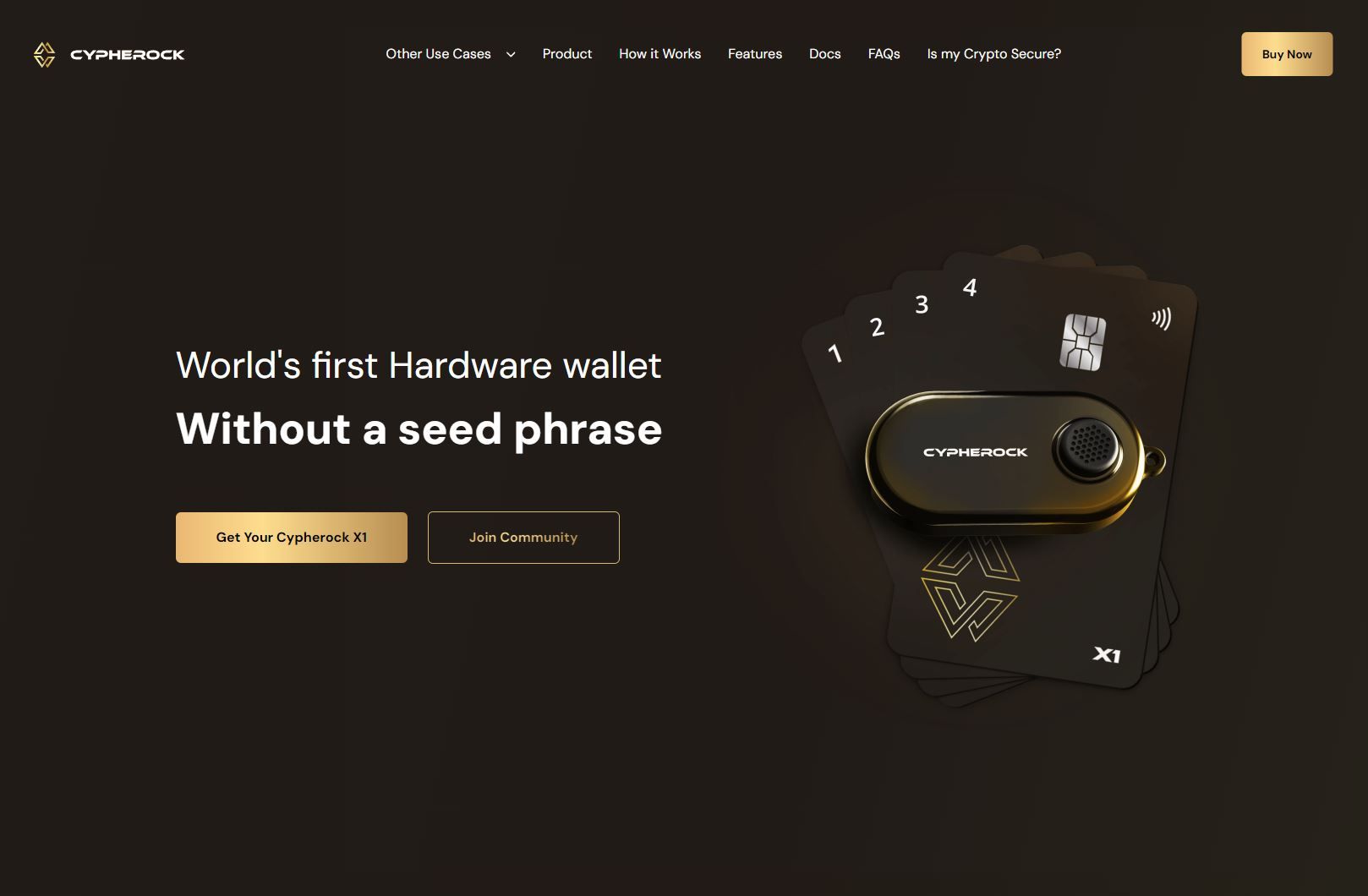
Trezor One
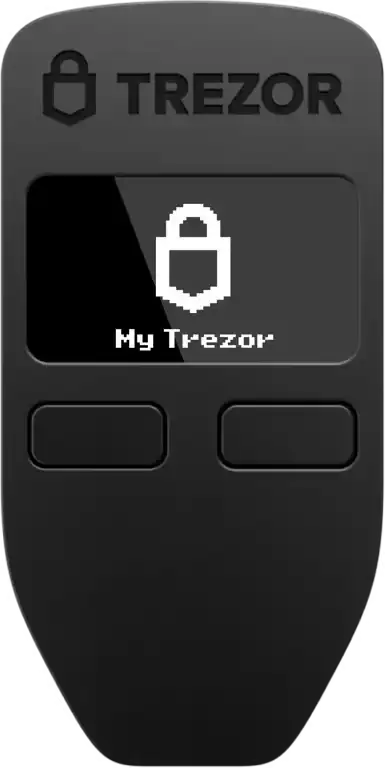
Key Specs
| Wallet | Price | Open Source | blockdyor Score |
|---|---|---|---|
| Trezor One | €59.00 ($59.00) | Yes | ⭐⭐⭐⭐ 74/100 |
Why We Chose It
The original hardware wallet from Trezor, the Trezor One, has been in existence for over a decade. Despite its age, it remains available for purchase on the Trezor store and works seamlessly with the Trezor Suite as well as third-party applications. Supporting Bitcoin, Ethereum, and a range of ERC-20 tokens, the Trezor One prioritizes security while being entirely open-source.
Managing your assets is straightforward: connect the Trezor to your computer and access the Trezor Suite App. Weighing merely 12 grams and compact in size, it can be conveniently carried on a keychain or stored in your pocket. With its affordable price point, the Trezor One continues to be hailed as one of the most easy to use and cost-effective hardware wallets on the market, offering excellent value for money.
Pros & Cons
| Pros | Cons |
|---|---|
| ✅ bitcoin (BTC) and over +8,000 altcoins and ERC-20 coins supported | ❌ Some token are not supported, others need 3rd party wallets |
| ✅ Almost 10 years in production | ❌ Has been hacked in the past |
| ✅ Affordable | ❌ No wireless connectivity |
Overview
The Trezor One, also known as the Trezor Model One, stands as a pioneering model in the realm of hardware wallets, debuting nearly a decade ago as the world's first mass-produced crypto wallet. Despite its age, this revolutionary device remains in production today, a testament to the enduring dedication of the SatoshiLabs team.
Engineered to safeguard your cryptocurrency and let you safely do transaction signing and safe cold storage, the Trezor One can store Bitcoin, Ethereum, and a plethora of ERC-20 tokens securely, operating offline to ensure the confidentiality of your private keys and transactions. Weighing a mere 12 grams and compact in size, it offers high portability, fitting snugly on a keychain or in your pocket. With its user-friendly interface, managing your assets is a breeze: simply connect the Trezor to your computer and launch the Trezor Suite App.
Despite its age, the Trezor One remains a stalwart choice for securing your digital assets, delivering exceptional value for money in an ever-evolving crypto landscape.
Full Review
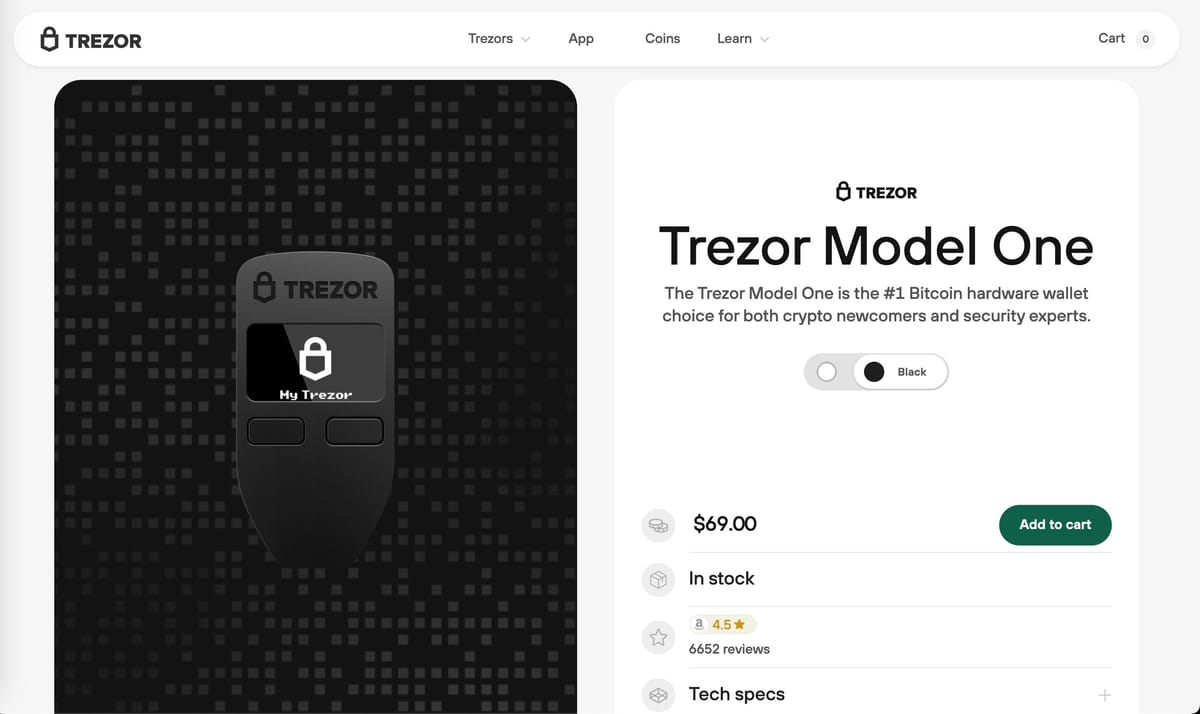
OneKey Classic
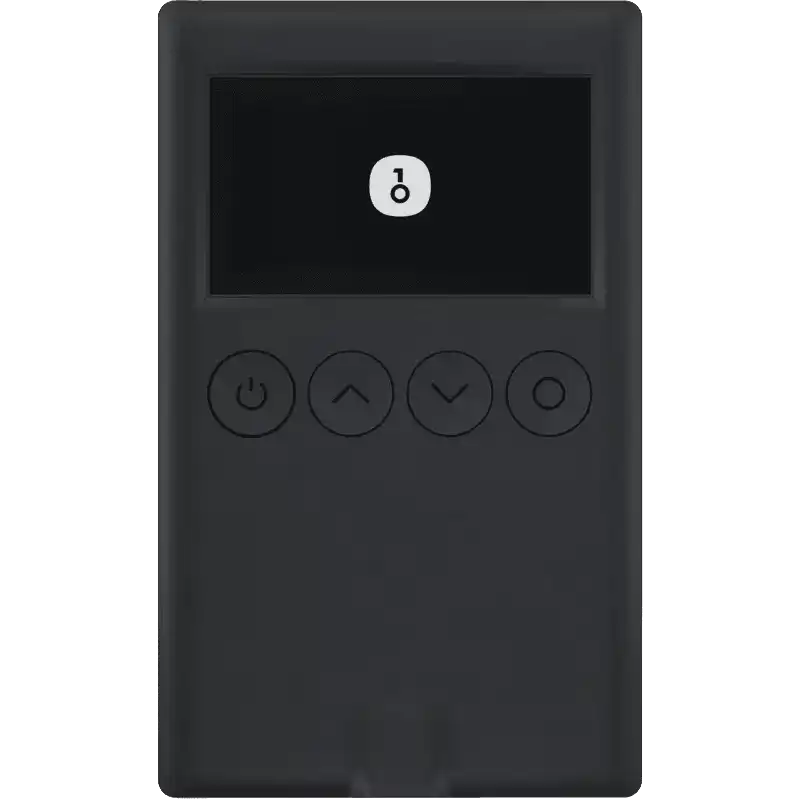
Key Specs
| Wallet | Price | Open Source | blockdyor Score |
|---|---|---|---|
| OneKey Classic | €84.13 ($89.00) | Yes | ⭐⭐⭐⭐ 69/100 |
👉 To order the OneKey Classic from the OneKey official website, click here.
Why We Chose It
The OneKey Classic stands out as an open-source, compact, and highly portable cryptocurrency wallet capable of storing Bitcoin alongside a diverse array of altcoins. Emphasizing simplicity in its design, this wallet features an OLED display, four buttons, and a USB Type-C port for secure computer connectivity, ensuring that your private keys remain on your device at all times.
A notable highlight of the OneKey Classic is its remarkable thinness, measuring a mere 3mm in thickness. This feature positions it as arguably the thinnest crypto hardware wallet globally, excluding NFC cards. Despite its super-thin profile, it includes an internal battery, enabling users to seamlessly interact wirelessly with various wallets. This combination of sleek design and functional features makes the OneKey Classic a compelling choice for users seeking both convenience and security in managing their digital assets.
Pros & Cons
| Pros | Cons |
|---|---|
| ✅ Modern Design | ❌ No Airgapped mode |
| ✅ Great value for money | ❌ Non-reproducible build |
| ✅ Advanced native Apps | ❌ No Bitcoin-only firmware |
Overview
The OneKey Classic is a cryptocurrency wallet renowned for its simplicity and sleek design. Equipped with an OLED display, four buttons, and a USB Type-C port for secure computer connectivity, it ensures that your private keys remain safe in the secure element of the device.
Its standout feature is its remarkable thinness, measuring just 3mm thick, possibly making it the thinnest crypto hardware wallet worldwide, excluding NFC cards. Despite its slim build, it includes an internal battery, enabling seamless wireless interaction with various software wallets.
Beyond its lightweight construction, the OneKey Classic is celebrated for its user-friendly design, facilitating the management of not only bitcoin but also a wide range of cryptocurrencies. With its slim profile, potent Bluetooth module, and compact battery, this wallet empowers users to oversee their crypto assets across all main platforms, ensuring secure access wherever they are. If you're seeking an affordable, secure, and user-friendly hardware wallet, the OneKey Classic is a compelling choice.
Full Review
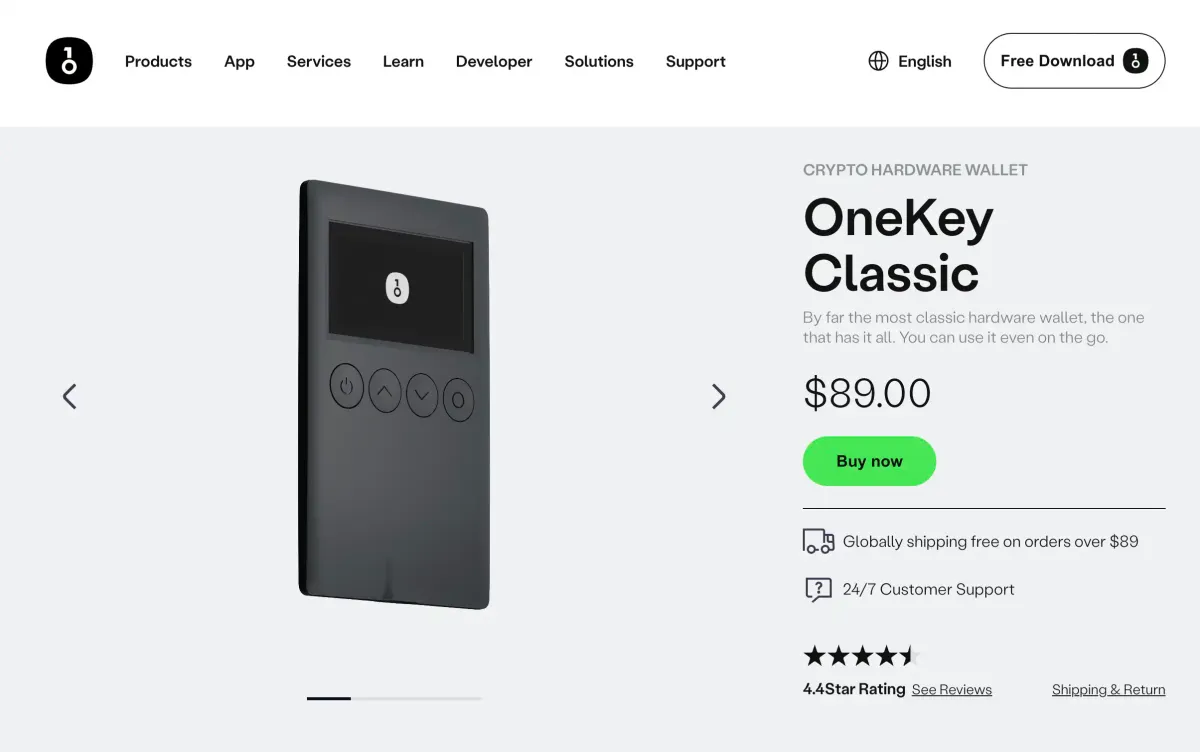
Tapsigner

Key Specs
| Wallet | Price | Open Source | blockdyor Score |
|---|---|---|---|
| Tapsigner | €36.97 ($39.99) | No | ⭐⭐⭐⭐ 69/100 |
👉 To get the Tapsigner for a special price on Coinkite's official website, click here.
Why We Chose It
Tapsigner is a NFC card developed by the canadian bitcoin company Coinkite that aims to simplify self custody of Bitcoin with a simple and portable card that host the private key inside of it and you can spend and receive funds by simply tapping it with the integrated NFC to a third party vendor app like Nunchuck.
It also support multisig configurations, so you can use it for more advanced setups such as collaborative custody, unlocking more possibilities.
Pros & Cons
| Pros | Cons |
|---|---|
| ✅ Great for cold storage on the go | ❌ No Lightning Network support |
| ✅ Not just an hardware wallet, but can act as a key in multisig setups | ❌ NFC passive tags can last for decades, but still don't know exactly how long |
| ✅ Plenty of entropy options with Nunchuck | ❌ Must be always stored with the sleeve |
Overview
Tapsigner emerges as a groundbreaking Bitcoin hardware wallet, in the form of a card, introduced by Coinkite to meet the escalating demand for top-tier security measures. Positioned as the simplest cold storage solution, Tapsigner ingeniously leverages NFC technology, enabling users to tap the card on their smartphone or desktop NFC reader and enter a PIN to authorize transactions securely.
Working as a compact hardware wallet, Tapsigner operates seamlessly with mobile/desktop wallets, holding the private key while the software wallet handles transactions. This innovative card also supports multi-signature setups, enhancing security for users. With its NFC chip, Tapsigner streamlines transactions, offering lightning-fast processing and secure message signing.
Despite lacking a display (of course: it's a card), its compact design ensures convenience and portability, making it a versatile choice for managing BTC. The package includes the Tapsigner card and an RF-blocking sleeve for added security, making it a go-to solution for multisig Bitcoin holdings on-the-go.
Full Review
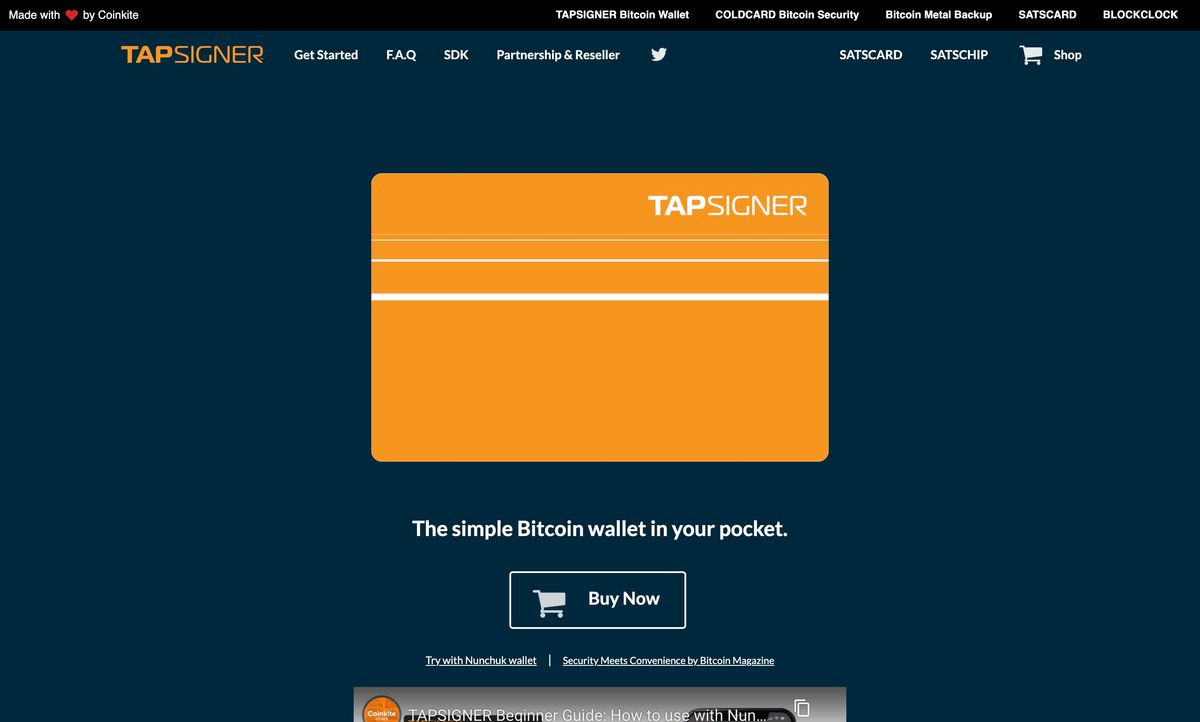
Satscard

Key Specs
| Wallet | Price | Open Source | blockdyor Score |
|---|---|---|---|
| Satscard | €6.99 ($6.99) | No | ⭐⭐⭐⭐ 66/100 |
👉 To get the SATSCARD for a special price on Coinkite's official website, click here.
Why We Chose It
The Satscard it's a great revolution in the Bitcoin Hardware Wallet industry, as it provides a physical and tangible form of Bitcoin, similar to cash in hand. This makes it easier to understand and use, especially for those who are not familiar with digital currencies.
With a quite low price point, it's a great solution for starters. It's basically a card, that has a private key inside of it and a receiving address. You can pair with software wallets like Nunchuck to sweep the funds, but it's best used to pass it along just as cash in hand, even without using the blockchain.
Pros & Cons
| Pros | Cons |
|---|---|
| ✅ Enables easy spending of Bitcoin | ❌ If lost, all BTC inside the slots are lost (there isn't a backup solution) |
| ✅ Provides a convenient alternative to traditional payment methods | ❌ To spend it, requires a companion app |
| ✅ Offers enhanced security features for Bitcoin transactions | ❌ ATM, there is only one companion app (Nunchuck) |
Overview
The Satscard offers a convenient and secure way to handle Bitcoin transactions in physical form. As an NFC-based Bitcoin storage card, it allows for easy gifting, trading, and spending with high anonymity and security. With its companion app, Nunchuk, users can quickly access and manage their Bitcoin stored on the card via NFC tap and a 6-digit card verification code (CVC).
Featuring multiple disposable slots and security features such as NFC, a 6-digit PIN, and entropy for seed generation, this card ensures the safety of users' funds. Its innovative design enables physical Bitcoin transactions without the need for blockchain involvement, offering unparalleled convenience and privacy.
Despite its compact size, the Satscard delivers exceptional functionality, making it an excellent choice for individuals seeking a tangible and private way to engage with cryptocurrencies. With its affordability and versatility, the Satscard provides a seamless solution for gifting, trading, and securely managing Bitcoin transactions.
Full Review
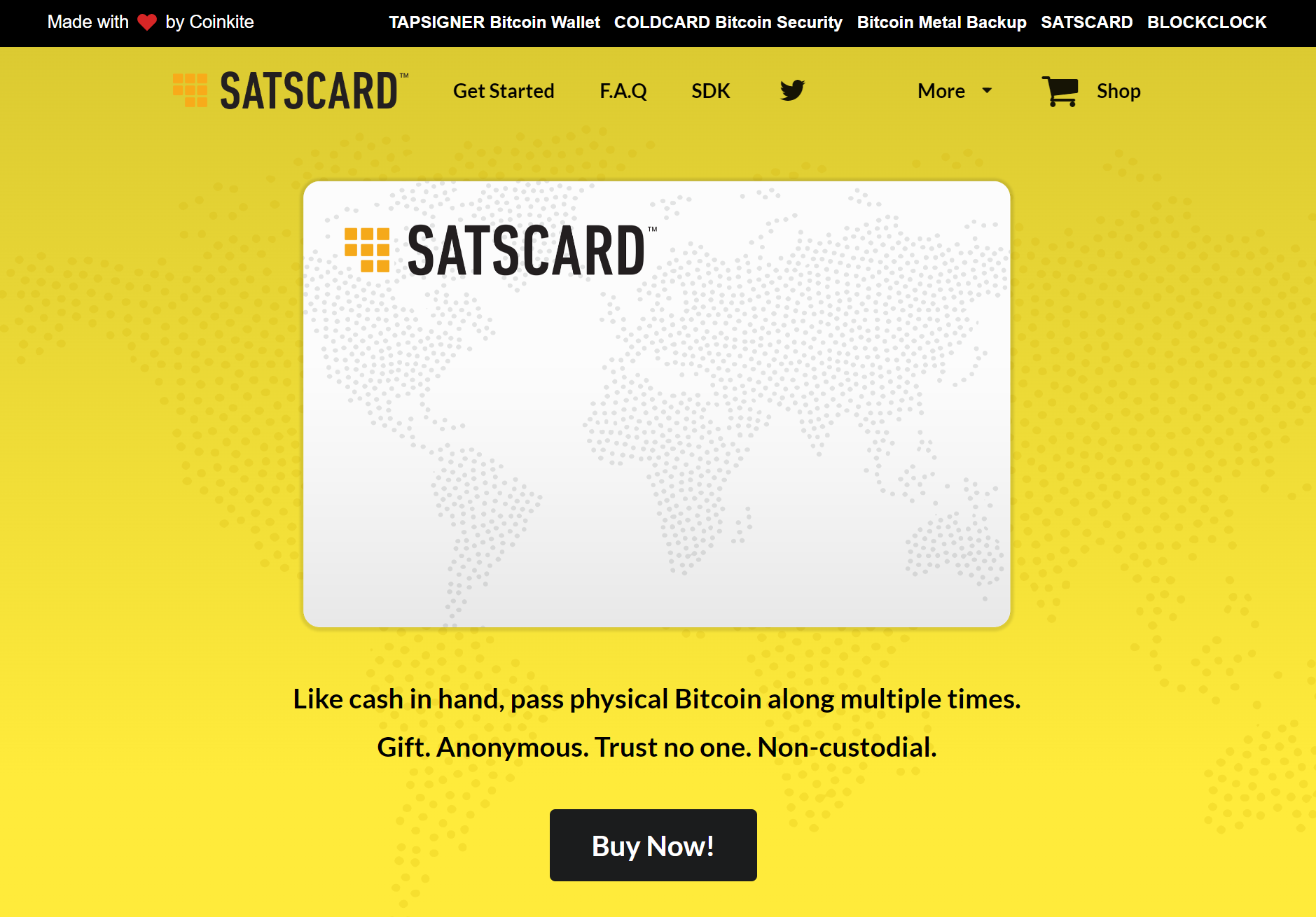
Ledger Nano S Plus
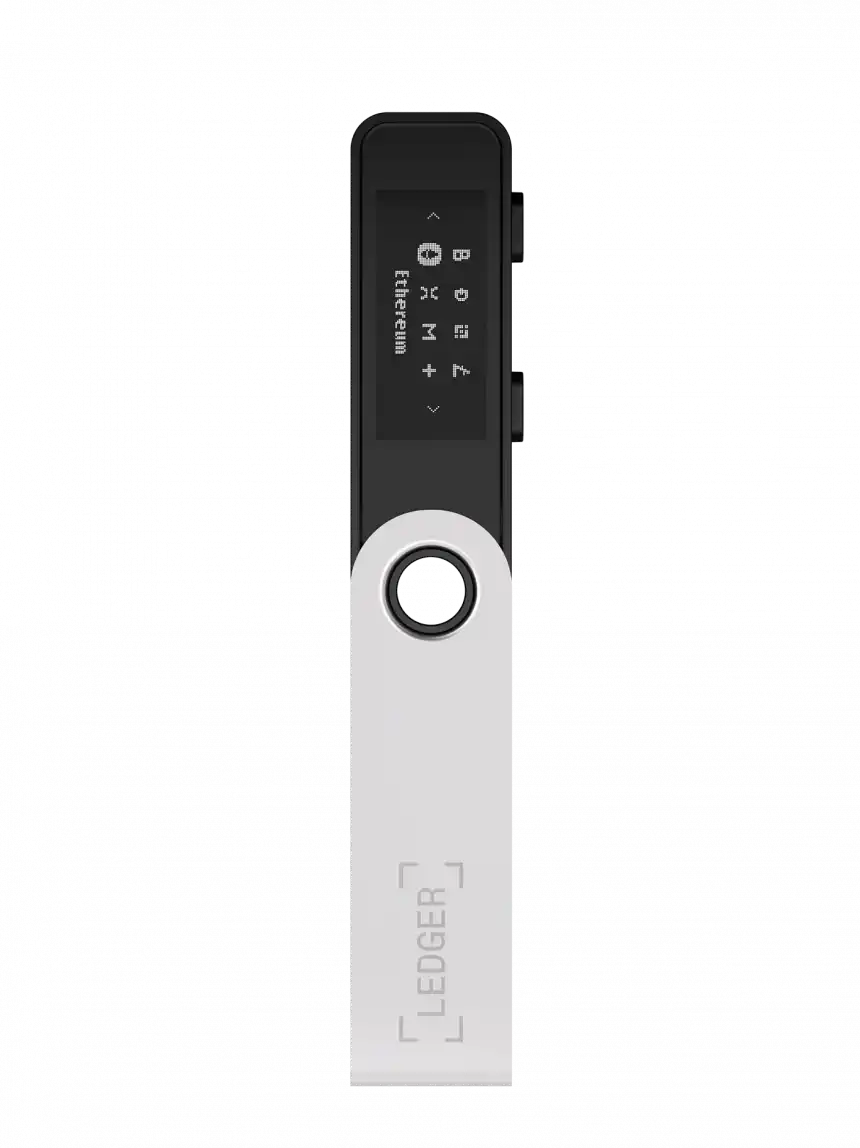
Key Specs
| Wallet | Price | Open Source | blockdyor Score |
|---|---|---|---|
| Ledger Nano S | €79.00 ($79.00) | No | ⭐⭐⭐⭐ 66/100 |
👉 Click here to buy the Ledger Nano S Plus for a special price.
The Ledger Nano S Plus stands out as one of the most popular crypto hardware wallets on the market. Renowned for its robust build quality, it offers support for a wide range of cryptocurrencies.
Operating with simplicity and consistency, the Ledger Nano S Plus is deliberately crafted to be user-friendly, catering especially to beginners in the crypto space. However, compared to some other hardware wallets, it's not open source and it does lack certain advanced features such as an entropy generator with dice or a native air-gapped mode. Despite these limitations, its solid construction and ease of use make it a preferred choice for many seeking reliable and straightforward cryptocurrency storage.
Pros & Cons
| Pros | Cons |
|---|---|
| ✅ Easy to use | ❌ Closed source |
| ✅ Great design, easy to carry | ❌ No custom entropy |
| ✅ +5000 crypto supported | ❌ No Airgapped mode |
Overview
Ledger, often likened to the Apple of crypto hardware wallets, maintains its dominance in the market with the Ledger Nano S Plus, surpassing competitors in sales. While the company continuously introduces new models and technologies, this review focuses on their entry-level offering, the Ledger Nano S Plus. Recently enhanced to accommodate the growing interest in Web3 and NFTs, it remains a stalwart workhorse in the crypto community.
The Ledger Nano S Plus, a hardware wallet or "signing device," secures private keys offline, safeguarding against potential threats. With vast crypto support exceeding 5500 types, facilitated by the Ledger Live companion app, users can manage a diverse portfolio conveniently.
Despite lacking some advanced features, its simplicity appeals to beginners. With a sleek design, durable build, and USB Type-C connectivity, the Ledger Nano S Plus ensures reliable crypto storage and transactions.
Full Review
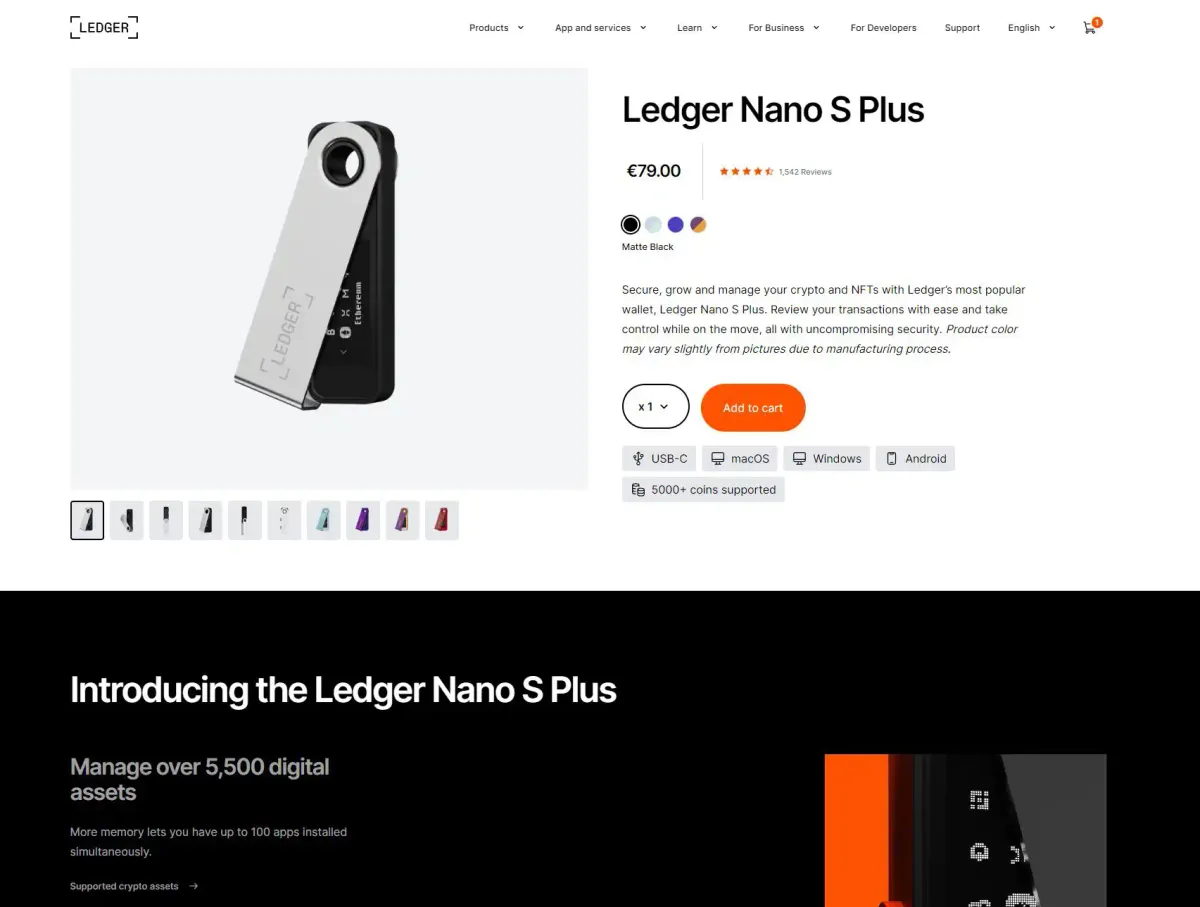
What Is A Crypto Wallet?
A crypto wallet, whether hardware or software-based, works as a safe place for your private keys, enabling you to cryptographically authorize transactions and manage your cryptocurrency. Here's what it typically does:
- Safely stores your private keys, essential for signing transactions
- Provides receiving addresses for funds deposition
- Create transactions and broadcasting them within the network
While software wallets are widely used, hardware wallets offer advanced security features, as highlighted in our review of leading hardware wallet options.
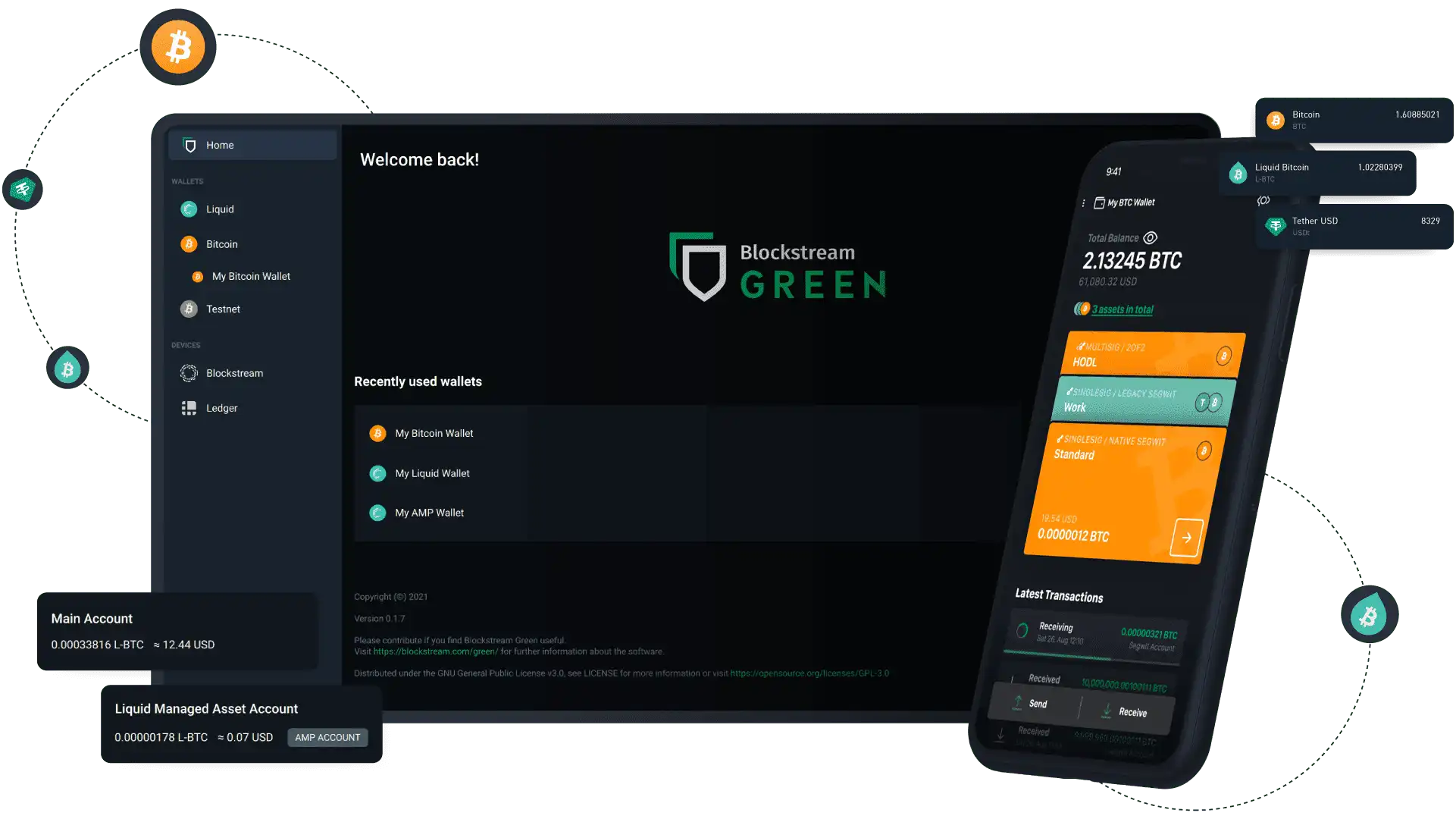
Contrary to common perception, wallets do not actually "hold" cryptocurrencies. The term "wallet" is more of a user-friendly abstraction. In reality, a crypto wallet stores private keys, granting access to cryptocurrencies secured within the network. For instance, Bitcoin resides on the Bitcoin Network, and your wallet safeguards the private keys required to spend those coins.
Private and Public Keys
Private keys, which are basically lengthy cryptographic codes, serve as access keys to your cryptocurrencies. Instead of memorizing them, wallets often generate a mnemonic sentence, typically comprising 12 or 24 words, known as a seed phrase. This phrase, distinct (but obtained) from the private key, acts as a backup.
Your wallet employs the private key to generate a public key, which works as your cryptocurrency public address. The address is derived from the public key through one-way cryptographic hashing, ensuring secure transactions.
In essence:
- Others use your public key-derived receiving address to send cryptocurrencies
- You use your private key to spend them
- The seed phrase, originating from your private key, serves as a backup and typically consists of 12 or 24 words stored offline
It's crucial to safeguard your private key and seed phrase, as they are confidential. While sharing your public key is safe, disclosing your private keys or seed phrase could result in fund theft.

Do You Need a Crypto Wallet?
If you are looking to own real cryptocurrencies, such as Bitcoin, a wallet is essential. While investment banks offer alternatives like the Spot Bitcoin ETFs, these are essentially IOUs and lack the authenticity of true cryptocurrencies like bitcoin: a true bearer asset. Additionally, banks and exchanges are susceptible to bankruptcy, so act accordingly.
Getting a crypto wallet doesn't always require spending money; you can begin with a software wallet for basic transactions. Bitcoin Core for example, is a great way to start with self-custody bitcoin.
However, for substantial cryptocurrency holdings, enhancing security with a crypto hardware wallet, like those outlined in our recommendations, is recommended. With a hardware wallet, your private key remains secure within the device, shielded from online threats within a secure element chip (in most wallet models).
Custodial vs Non-Custodial Wallets
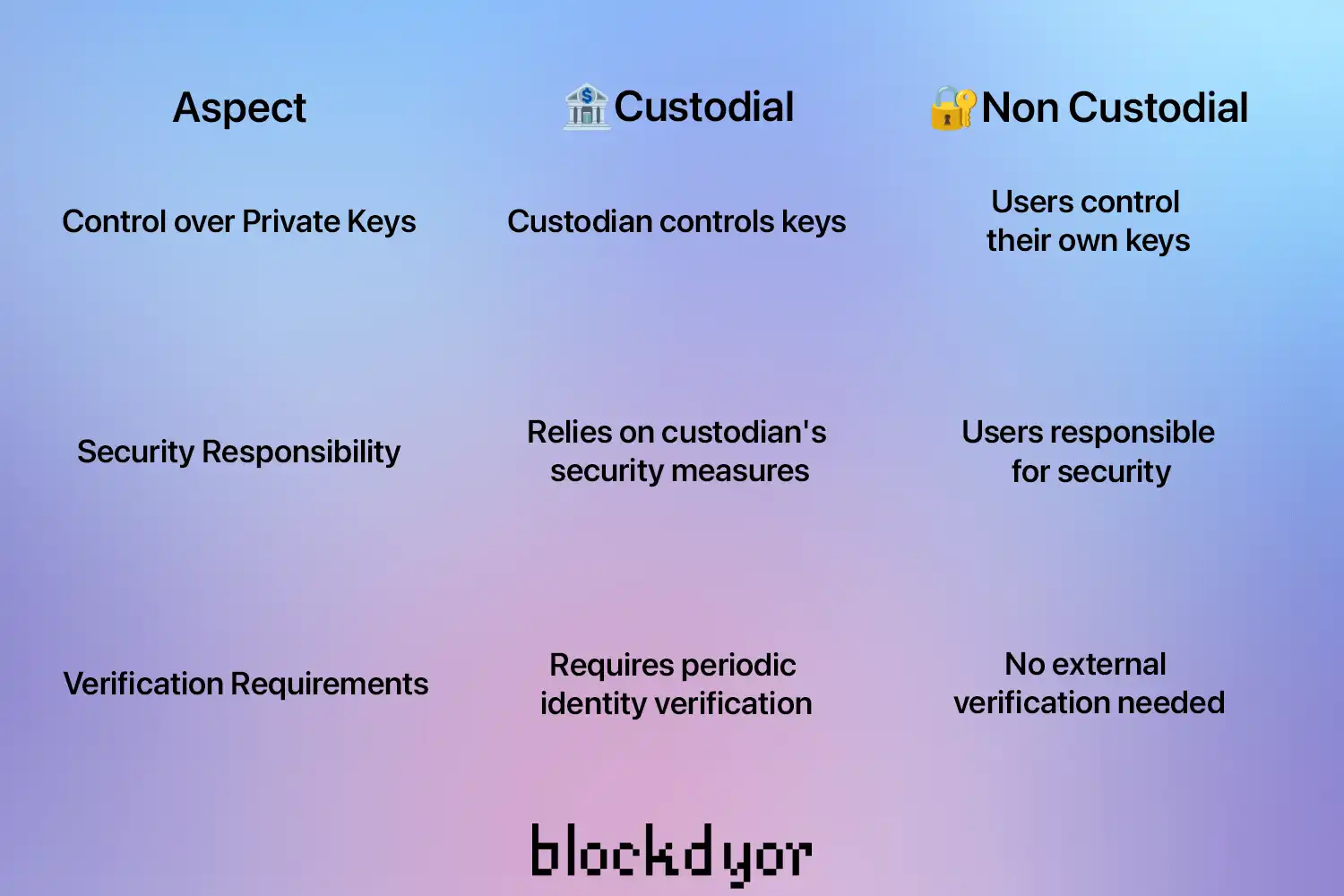
Understanding the nature of your wallet is crucial as it dictates your level of self-sovereignty over your assets. Wallets generally fall into two categories:
- Custodial Wallets: These wallets entrust a third party with the custody of your private keys. Most commonly seen in exchanges, custodial wallets involve the exchange holding the private keys of users' cryptocurrencies, typically backed by a 1:1 reserve.
- Non-Custodial Wallets: In contrast, non-custodial wallets, such as the one evaluated on this guide, empower users to retain control over their private keys independently. This setup grants users full authority over their cryptocurrency holdings.
Though not explicitly outlined in the Bitcoin Whitepaper, a good way for managing a cryptocurrency like Bitcoin is to personally hold your private keys. Despite advancements like collaborative custody which streamline self-custody and mitigate risks of irreversible loss, non-custodial wallets entail greater complexity compared to custodial options. With non-custodial wallets, users bear the responsibility of safeguarding their devices and backups. However, diligent management ensures minimal risk of fund loss as users exclusively control their private keys, eliminating the need to place trust in third parties.
While custodial solutions may find utility in certain contexts, such as institutional ETF issuers like BlackRock using custodians like Coinbase, reliance on third parties poses inherent security vulnerabilities. Custodial wallets expose users to risks such as bankruptcy or hacking of the custodian, potentially leading to loss of access to funds. Additionally, third-party custodians often enforce periodic identity verification (KYC), which can impede the fluidity of fund transfers due to verification delays and approval processes.
Types Of Crypto Wallets
There are several types of crypto wallets. At the forefront are hardware wallets, offering self-custody where you control the private keys. As you descend the list, wallet security decreases due to constant internet connectivity (making them more susceptible to hacking) or because they are custodial, meaning you don't hold the keys.
- Cold Wallets: Have hardware protection, highly secure against hacking.
- Multisig Wallets: Require multiple keys for transactions, offering an even more advanced security.
- Mobile Wallets: Can be custodial or non-custodial, offering varying security levels. E.g: Blue Wallet.
- Desktop Wallets: Available for desktop computers, varying in security levels. E.g: Bitcoin Knots, Blockstream Green, Sparrow Wallet.
- Browser Extension Wallets: Lack hardware protection, vulnerable to hacking. E.g: MetaMask.
- Exchange/Web Wallets: Often custodial, risky for storing substantial funds. E.g: Coinbase, Kraken, Bitfinex.
- Hot Wallets: Accessed online, more prone to hacking. Not ideal for significant funds. E.g: Robinhood, Coinbase Wallet, Revolut.
Things To Consider When Choosing A Crypto Wallet
While it may seem that all hardware wallets are equal, there are numerous nuances to consider. This is why we meticulously rated each one against our blockdyor Score to objectively determine their quality.
- Open Source: The software of the hardware wallet should ideally be open source or at least viewable, with FOSS (Free and Open Source Software) preferred for its enhanced freedom. Also, the open source software benefits from more eyes on the code, making it more secure and trustworthy compared to closed source alternatives.
- Verifiable Code: It's crucial to be able to verify the authenticity of the software binaries and PGP key signature provided by following the instructions on the website. This ensures that the downloaded software is genuine and hasn't been tampered with.
- Entropy Sources: A higher number of entropy sources during seed generation leads to increased randomness in the private key generation process. Wallets with 2-3 or more sources of randomness are preferred, with the option to manually add entropy, such as through dice rolls, being an additional benefit.
- Secure Element: A secure element chip inside the hardware wallet encrypts the private key on the processor, providing protection against digital and physical attacks, enhancing security and peace of mind.
- Air-gapped: Advanced users may prefer the option to keep the hardware wallet completely disconnected from the internet or any other device, known as an air-gapped configuration, for maximum security.
- 3rd Party Vendors: The hardware wallet manufacturer should support the use of third-party software wallets like Sparrow Wallet or Blockstream Green. This reduces the risk of coordinated attacks and provides flexibility for users to utilize their preferred software wallet with all its features.
- Backup: Hardware wallets should adhere to interoperable standards for private key backup, such as BIP39 (Hierarchical Deterministic Wallet), ensuring compatibility and ease of migration to different hardware vendors if necessary. This let users have control over their assets even in unforeseen circumstances.
Bottom Line
Self-custody is crucial for protecting yourself from theft and the risk of crypto exchange bankruptcies. Using a hardware wallet represents an act of self-sovereignty, allowing you to have full control over your Bitcoin or other altcoins as bearer assets, independent of exchanges.
While numerous hardware wallets exist, there isn't a single best option for everyone. Preferences vary; some prioritize ease of use, while others seek airgapped functionality or open-source design. However, our curated list includes options catering to diverse needs, representing what we consider the best crypto wallets currently available on the market.



